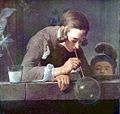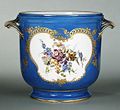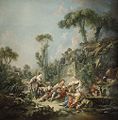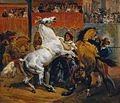Topics/2010
| USAD Curriculum Topics | |
|---|---|
| 1998 • 1999 • 2000 • 2001 • 2002 • 2003 • 2004 • 2005 2006 • 2007 • 2008 • 2009 • 2010 • 2011 • 2012 |
The curricular theme for 2009-2010 will be the French Revolution.
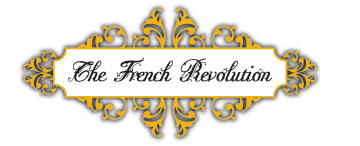
Super Quiz[edit]
The Super Quiz™ will focus on the French Revolution, and the Super Quiz™ Resource Guide will include readings on such topics as the Old Regime (Ancien Régime), the causes of the French Revolution, the radicalization of the revolution, the revolution in Saint-Domingue (Haiti), and the legacy of the French Revolution.
Art[edit]
The art curriculum topic will be 18th and early 19th century French art, and the curriculum will include the study of eighteen selected artworks.
Pieces[edit]
Rococo[edit]
-
Mezzetin by Jean-Antoine Watteau
-
Soap Bubbles by Jean-Simeon Chardin
-
Wine Cooler by Vincennes Porcelain Factory
-
Broken Eggs by Jean-Baptiste Greuze
-
Shepherd's Idyll by Francois Boucher
Neoclassicism[edit]
-
Modern Rome by Giovanni Paolo Panini
-
The Death of Socrates by Jacques-Louis David
-
The Triumph of Aemilius Paulus by Carle Vernet
-
Minerva Protecting the Young King of Rome by Joseph-Antoine Romagnesi
Romanticism[edit]
-
Stormy Coast Scene after a Shipwreck by Horace Vernet
-
The Start of the Race of the Riderless Horses by Horace Vernet
-
Royal Tiger by Eugene Delacroix
-
Young Jewish Woman of Algeria, Seated by Theodore Chasseriau
Portraiture[edit]
-
Portrait of a Young Man by Pompeo Girolamo Batoni
-
Self-Portrait with Two Pupils by Adelaide Labille-Guiard
-
Bust of Voltaire by Jean-Antoine Houdon
-
Princesse de Broglie by Jean-Auguste-Dominique Ingres
Economics[edit]
The economics curriculum will cover fundamentals of economics, including general topics in macro- and microeconomics and international trade and global economic development. The economics curriculum will also include a thematic section focused on the economic history of Revolutionary France.
Language and Literature[edit]
The language and literature curriculum will include critical reading, one novel, and six shorter works. The featured novel will be A Tale of Two Cities by Charles Dickens.
Short Works[edit]
- A Song of Liberty from The Marriage of Heaven and Hell by William Blake
- The French Revolution as It Appeared to Enthusiasts at Its Commencement by William Wordsworth
- The Dedication from Don Juan by Lord Byron
- Excerpt from The Social Contract by Jean-Jacques Rousseau
- Excerpt from A Vindication of the Rights of Men by Mary Wollstonecraft
- Excerpt from Rights of Man by Thomas Paine.
Math[edit]
The math curriculum will cover topics in the fields of general math, algebra, geometry, trigonometry, and differential calculus.
Music[edit]
The music curriculum will focus on music in France during the eighteenth and early nineteenth centuries and will include a companion CD, featuring fourteen listening selections.
Songs[edit]
- Tic-Toc-Choc, Franois Couperin
- Brillant auteur de la lumire, from Iphignie en Aulide by Christoph Willibald Gluck
- Cosa sento from Le nozze di Figaro and L ci darem la mano from Don Giovanni by Wolfgang Amadeus Mozart
- Symphony No. 85 (La Reine de France) by Joseph Haydn
- La Marseillaise and Chant du neuf Thermidor by Claude Joseph Rouget de Lisle
- Le chant du dpart by tienne Mhul
- Hymne la statue de la libert by Franois Joseph Gossec
- March of the Priests and Thunderstorm from La vestale by Gaspare Spontini
- March to the Scaffold from Symphonie fantastique by Hector Berlioz
- Salve Regina from Dialogues of the Carmelites by Francis Poulenc
Science[edit]
The science curriculum will focus on an introduction to chemistry and will include a brief overview of the historical development of chemistry with particular focus on the role of Antoine Lavoisier.

